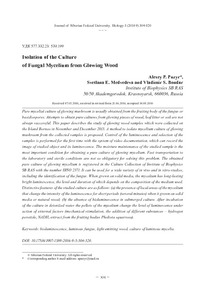Выделение культуры грибного мицелия из светящейся древесины
Скачать файл:
URI (для ссылок/цитирований):
https://elib.sfu-kras.ru/handle/2311/20571Автор:
Пузырь, А.П.
Медведева, С.Е.
Бондарь, В.С.
Puzyr, Alexey P.
Medvedeva, Svetlana E.
Bondar, Vladimir S.
Дата:
2016-09Аннотация:
В статье описан способ выделения культуры светящегося грибного мицелия из образцов светящейся древесины, обнаруженных на острове Борнео в ноябре-декабре 2013 года. Контроль свечения и отбор светящихся образцов впервые проводили с помощью системы видеодокументации. Показано, что для успешного выделения культуры светящегося грибного мицелия из обнаруженных в лесу образцов светящейся древесины обязательным условием является сохранение их влажности; не столь важна их быстрая транспортировка в лабораторию и соблюдение стерильных условий. При выращивании на твердых питательных средах полученный мицелий характеризуется низкой скоростью роста, длительным временем свечения, появлением и исчезновением локальных областей с высоким уровнем люминесценции. При культивировании гриба в условиях погруженной культуры свечение мицелия не регистрируется, что, вероятно, связано с отсутствием или крайне малым содержанием в биомассе субстрата люминесцентной реакции. Полученная чистая культура светящегося мицелия зарегистрирована в Коллекции культур Института биофизики СО РАН под номером ИБСО 2371 и может быть использована для широкого спектра исследований in vivo и in vitro, включая идентификацию гриба Pure mycelial culture of glowing mushroom is usually obtained from the fruiting body of the fungus or basidiospores. Attempts to obtain pure cultures from glowing pieces of wood, leaf litter or soil are not always successful. This paper describes the study of glowing wood samples which were collected on the Island Borneo in November and December 2013. A method to isolate mycelium culture of glowing mushroom from the collected samples is proposed. Control of the luminescence and selection of the samples is performed for the first time with the system of video documentation, which can record the image of studied object and its luminescence. The moisture maintenance of the studied sample is the most important condition for obtaining a pure culture of glowing mycelium. Fast transportation to the laboratory and sterile conditions are not so obligatory for solving this problem. The obtained pure culture of glowing mycelium is registered in the Culture Collection of Institute of Biophysics SB RAS with the number IBSO 2371. It can be used for a wide variety of in vivo and in vitro studies, including the identification of the fungus. When grown on solid media, the mycelium has long-lasting bright luminescence, the level and duration of which depends on the composition of the medium used. Distinctive features of the studied culture are as follows: (a) the presence of local areas of the mycelium that change the intensity of the luminescence for short periods (several minutes) when it grown on solid media or natural wood; (b) the absence of bioluminescence in submerged culture. After incubation of the culture in deionized water the pellets of the mycelium change the level of luminescence under action of external factors (mechanical stimulation, the addition of different substances – hydrogen peroxide, NADH, extract from the fruiting bodies Pholiota squarrosa)

